The fascination surrounding a summit between the presidents of China and the USA remains unbroken. The phrase “the two most powerful men in the world meet” focuses the interests of eight billion people on just two individuals.
In fact, the world became a little safer on Wednesday night. China and the USA agreed to restore direct communication between their militaries. This can help quickly resolve misunderstandings that could otherwise lead to escalation and war. Given the many near-collisions of ships and aircraft, this was urgently needed. However, only Xi Jinping and Joe Biden could make this decision.
Even more important was the fact that the two heads of state are back in closer contact. In reality, the presidents of China and the USA have an astonishing degree of personal power. While US democracy may surround the head of state and government with limitations through the separation of powers, the years under Donald Trump, in particular, showed what the president can do.
Xi Jinping’s power is undisputed; after all, he has brought the Communist Party under his personal control, eliminating any resistance in the world’s most populous country. A certain degree of personal rapport may prevent something worse, as analyzed by Michael Radunski.
The data and cybersecurity laws are increasingly affecting local business for German and European companies, as shown by a recent survey by the EU Chamber. In their current interpretation, these rules prohibit the transfer of “important” data from China.
This complicates the operation of modern IT systems where data is tossed back and forth between headquarters and branches in the cloud. Christiane Kuehl reports on how local businesses are reacting and where Beijing might reconsider.

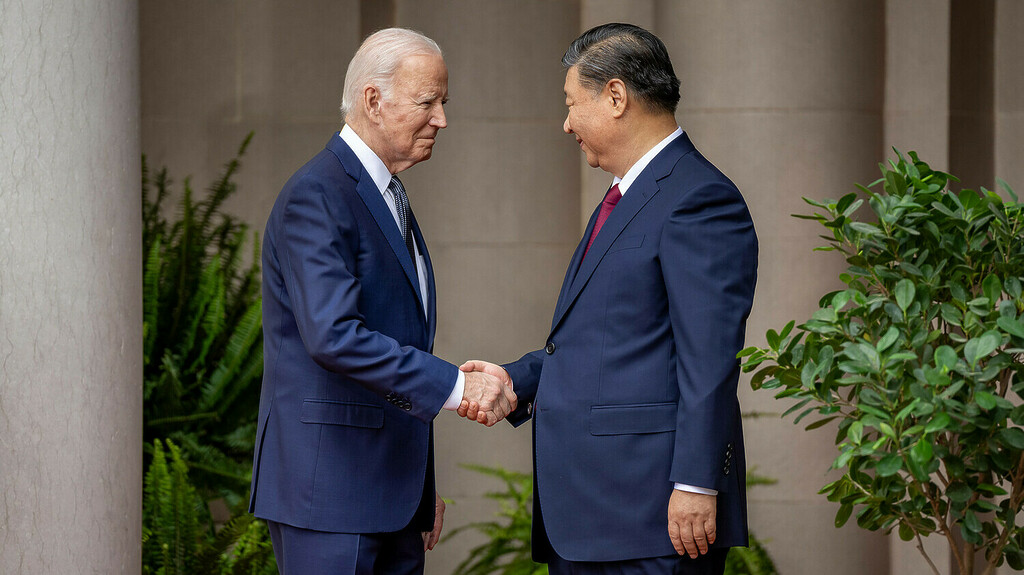
Xi Jinping and Joe Biden spoke for four hours on Wednesday. It is the first time in almost exactly a year that the leaders of the two world powers have engaged in direct dialogue. This alone speaks volumes about the state of relations between China and the United States. Today’s meeting on an estate about 40 kilometers south of San Francisco is, in itself, a positive sign.
Biden seemed to feel the need not to risk additional conflicts with China amid the crises in Ukraine and Gaza. “We must ensure that our rivalry does not end in conflict,” Biden said at the beginning. Despite the current tensions, there were some concrete results:
These decisions mark tangible progress between the USA and China. They signal that both sides are serious about stabilizing relations.
Several other issues were addressed without reaching an agreement:
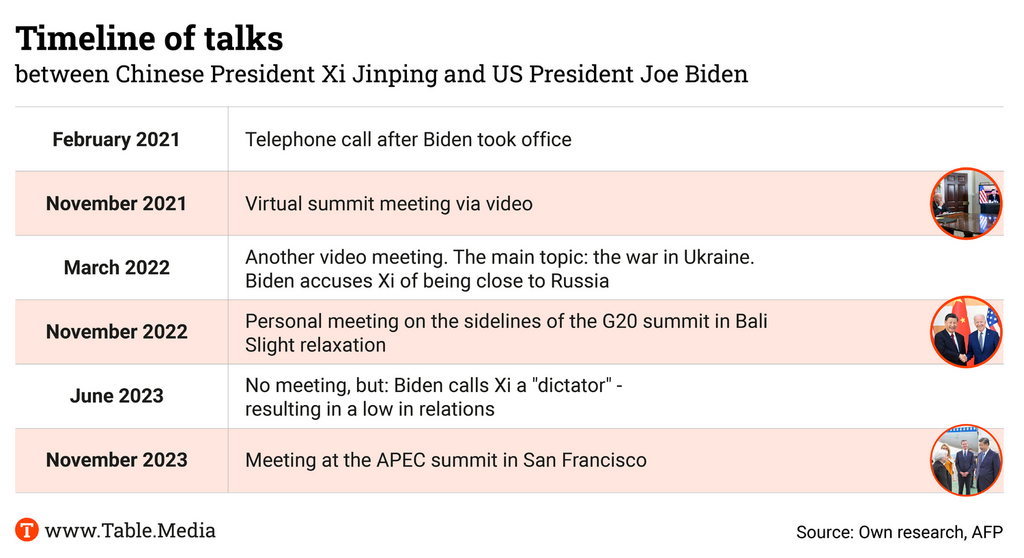
For other issues, it was already foreseeable that there would be no decision, let alone a solution:
These are issues based on the fundamental conflict between the US hegemon and the challenger China. An agreement is currently not possible. Both Biden and Xi are under too much pressure to allow even the impression of leniency toward their respective rivals in these matters. Biden is facing a tough election campaign and Xi urgently needs to revive China’s economy. However, with the meeting and the agreements reached, at least the downward spiral of recent months has been broken.
However, the US and China intend to revive their bilateral climate cooperation and jointly engage in reducing methane emissions and tripling renewable energies. This is stated in a joint statement released on Wednesday after a meeting between climate envoys John Kerry and Xie Zhenhua.
Li Shuo, who will soon become the director of the China Climate Hub at the Asia Society, described the relations between the world’s two largest greenhouse gas emitters as “a prerequisite for meaningful global progress”. Both countries had already agreed to triple renewable capacities at the G20 meeting in India.
However, both sides did not reach a common position on phasing out fossil fuels – an issue that will be a central point of contention at the upcoming climate conference. The joint statement only mentions a commitment to expand renewables “to accelerate the substitution of coal, oil, and gas generation”. China considers the complete abandonment of fossil fuels “unrealistic”. Ying Yuan of Greenpeace East Asia said, “At the moment, these are still words and not actions. There is still a big gap between these words and actions for both sides.” Collaboration: Finn Mayer-Kuckuk/Nico Beckert
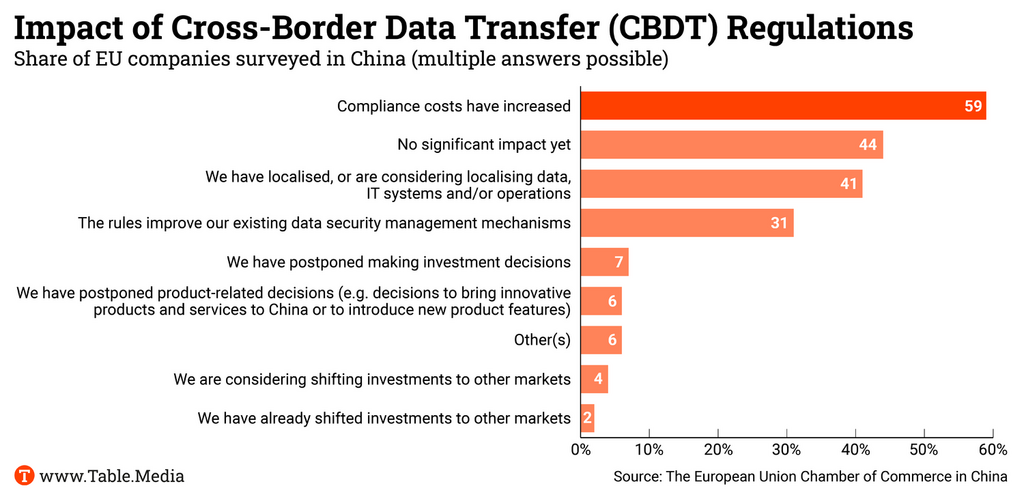
The European Union Chamber of Commerce in China (EUCCC) is hopeful for prompt clarity on rules for cross-border data transfer (CBDT) for its member companies. The recently presented draft for easing the strict laws gives cause for optimism, the chamber stated in a flash survey released on Wednesday. However, much is still unclear – especially whether the proposed simplifications will indeed materialize.
According to the survey, 55 percent of companies transfer data abroad, 31 percent do not, while 14 percent -interestingly – do not know precisely. Of those sending data abroad, 96 percent send them internally – to their headquarters or other regional offices. According to EUCCC, these transfers pose a low data security risk. Each 24 percent of respondents transfer data to suppliers or other business partners abroad.
The effects of laws enacted over the past years are already noticeable, according to the survey. 59 percent of respondents complain about increased compliance costs, 41 percent about pressure to localize IT systems or the entire operation of the China branch, thereby separating it from the rest of the world. However, 31 percent also state that the rules have improved the company’s data security management.
The laws in question are three, some of whose contents are still vaguely formulated:
At the end of September, the Cybersecurity Administration of China (CAC) raised hopes with a draft for easing and a lenient interpretation of general provisions for CBDT for foreign companies. Among other things, a list of exceptions from relevant obligations was discussed.
Moreover, the changes should bring more clarity about how data processors can check which data the authorities classify as “important”. However, only six percent of companies send what they themselves consider “important data” abroad, 81 percent would like to understand the term better.
According to consultants from Dezan Shira, the PIPL currently refers to “data that can endanger national security, economic operations, social stability or public health and safety once manipulated, destroyed, leaked or illegally obtained or used”. This can be almost anything with a strict interpretation. 59 percent of surveyed companies also want to know more precisely what the PIPL means by “personal information”.
Among the surveyed companies, 78 percent send employee data abroad, as well as 67 percent personal data of suppliers and customers. The EU Chamber concludes that these transfers are necessary for personnel purposes or to fulfill contracts, thus requiring an exemption for such transfers. The hope now is that the planned easing will bring precisely these exemptions.
The EU Chamber of Commerce aims to ensure that the relaxations are implemented as announced. “It is positive that China’s relevant authorities signal the intention to optimize the country’s data regulations,” said Chamber Vice President Stefan Bernhart. “European companies hope for more clarity on the associated terms and that their legitimate business needs will be considered both in sectoral regulations and compliance deadlines.”
According to the paper, security checks for data exports could now be relaxed
This applies, at least, when these do not include personal or “important” data. Additionally, the CAC may also consider completely abolishing security checks for personal data in certain situations, such as cross-border purchases, hotel reservations, hiring employees, or processing visa applications.
All of this would represent a significant improvement over the current legal situation. The EU Chamber is calling for the prompt adoption of the draft.
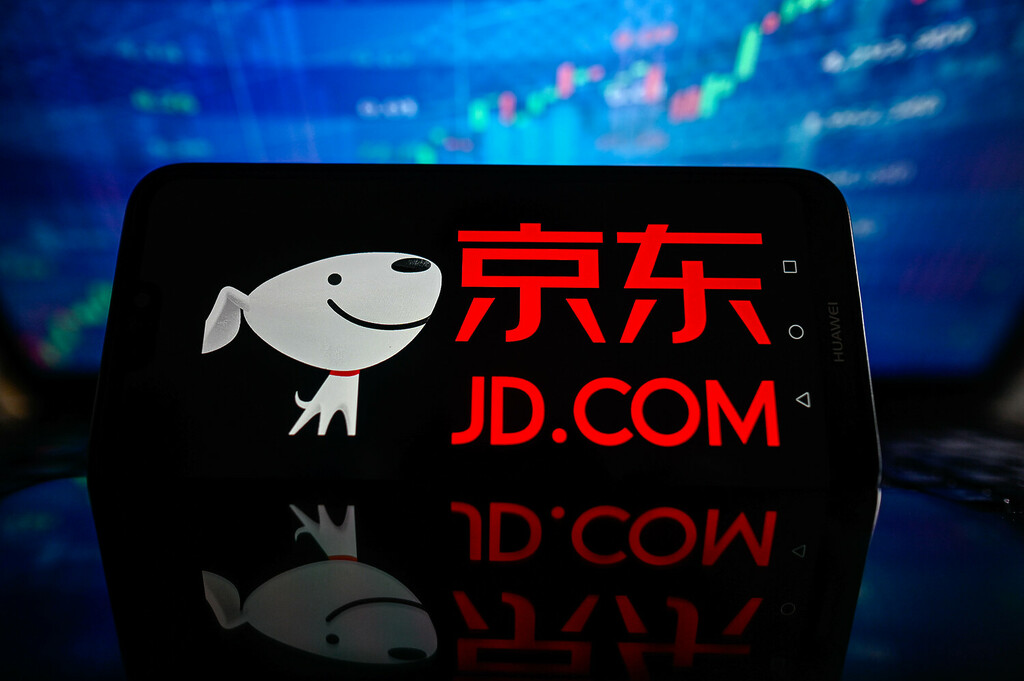
According to a report from Manager Magazin, the Chinese online retailer JD.com has expressed interest in acquiring the German electronics chains MediaMarkt and Saturn. One of the current owners, the investment company Haniel, has long been expecting a higher return on capital from Ceconomy, the operator of both retail chains. Negotiations between JD and Ceconomy are currently underway, as reported. The companies have not made any official statements, and the outcome of the negotiations is still uncertain.
JD is currently expanding into Europe and has already launched the trading platform Ochama there. Due to the low stock price of Ceconomy, it would be relatively inexpensive for a Chinese buyer at the moment. At the same time, growth in China’s home market has somewhat slowed down. fin
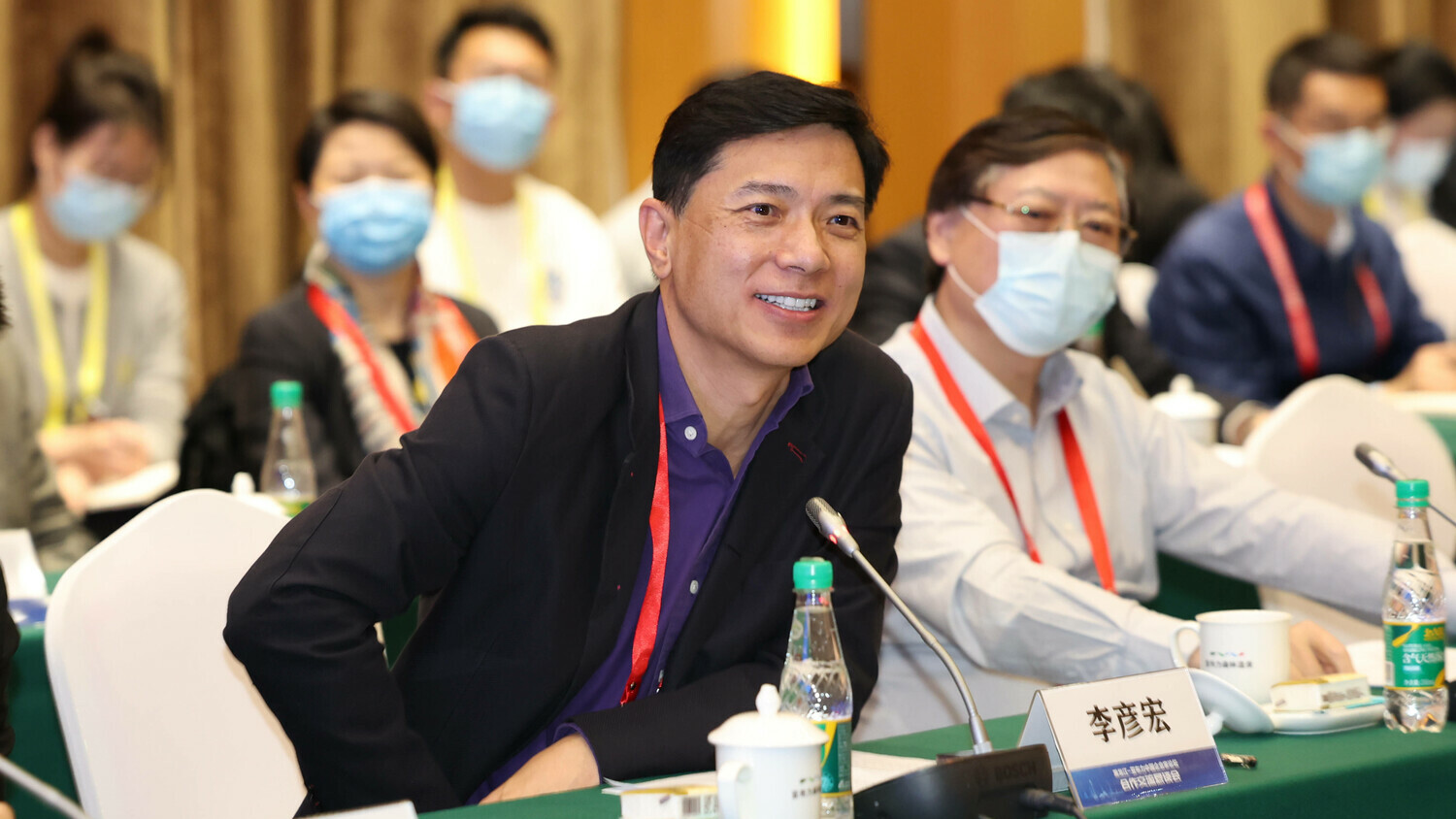
Robin Li, CEO of Baidu, cautioned on Wednesday at an industry forum in Shenzhen about the squandering of resources in the development of large AI language models. Li observed a phenomenon in China where many industries, companies, and even cities are acquiring hardware, stockpiling chips and building data centers to independently train proprietary large models from scratch. While these entities aim to develop significant language models, a considerable number lack a sustainable business model.
The release of OpenAI’s ChatGPT last year sparked immense interest in such applications in China, prompting both established companies like Baidu and numerous small startups to enter the competition for the best model.
Li likened a chatbot to an operating system, serving as the foundation for many other applications. However, he cautioned that the continuous development of fundamental large models represents a significant waste of social resources. Li recommended that companies, instead of exclusively focusing on large language models, should concentrate on the development of practical applications.
Baidu’s own chatbot, Ernie, was made publicly available in August but has thus far proven to be a disappointment for the tech industry. rad
It’s not just policymakers expressing concerns about Germany’s strong economic ties with China; investors are also raising red flags. Union Investment, the second-largest fund manager in the country with assets under management of around 432 billion euros, is cautioning against excessive dependence on the People’s Republic. According to a study covering nearly 2,000 publicly traded companies worldwide, Union Investment notes that “no other country, not even direct neighbors of China like Japan and South Korea, has so many large companies with high China exposure“. This applies to almost a quarter of all examined German companies.
China has been Germany’s largest trading partner since 2016, with bilateral trade totaling nearly 300 billion euros last year. In response to these ties, the German government released its China strategy in the summer, urging German companies to reduce their risks in China-related business and to internally account for so-called cluster risks when focusing on a large market. Investment and export credit guarantees are set to face stricter scrutiny.
The study by Union Investment highlights a noteworthy trend: German companies are increasingly shifting research and development activities to China, especially in the automotive sector. The study underscores, “This is remarkable because other companies are, for security reasons, bringing these functional areas back home.” This strategy, according to analysts, is risky on multiple levels. “As areas with higher value-added are withdrawn from the home country and, at the same time, the supplier industry loses orders, the economic location of Germany suffers,” warn the analysts.
Union Investment holds shares in nearly all major publicly traded companies, including automakers like Volkswagen, BMW and Mercedes-Benz, as well as the chemical giant BASF, all of which have strong ties to China. German automakers should expect retaliatory measures if Berlin attempts to shield them from Asian competitors in their domestic market. The study notes, “Unlike ten years ago, the technologies offered by German automakers can now be replaced. Retaliation will be less painful for China – a well-known critical factor for Beijing.” rtr
In the first three quarters, 5.69 million marriages were registered in China. This is 245,000 more than at the same time last year, according to data from the Ministry of Civil Affairs. This could halt a nine-year downward trend, as fewer and fewer people have been getting married in China since 2013. At that time, nearly 13.5 million couples said “I do.”
The upswing in marriages is seen as a glimmer of hope amid a declining birth rate and a rapidly aging population, as reported by the “South China Morning Post“. These long-term demographic challenges have long been casting shadows on the economic prospects of the People’s Republic. Therefore, pilot projects have been launched in over 20 cities to create a “new era of marriage and childbirth culture“. rad
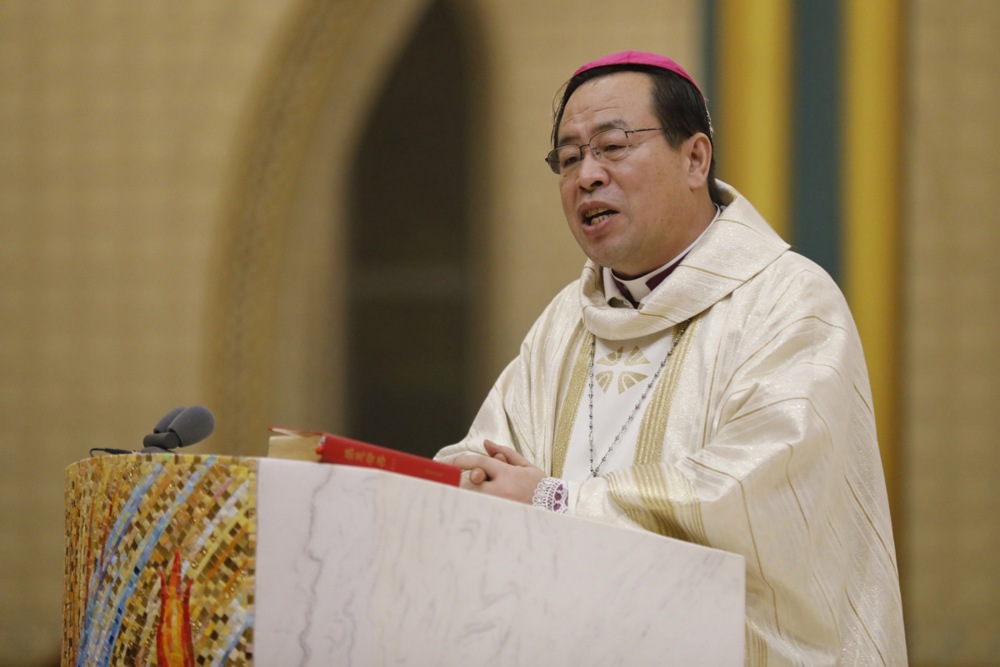
Bishop Joseph Li Shan, appointed by China bypassing the Vatican, traveled to Hong Kong for a several-day visit on Tuesday. It marks a rare contact between the state-controlled Catholic Church in China and the actual Catholic Church with the Vatican at its helm.
China retains control over religion in its own country. However, there is an agreement on the mutually agreed-upon filling of bishop positions. The Pope does not want Catholic Christians in China to be without organization. Nevertheless, Beijing consistently irks the Vatican by autonomously appointing bishops.
Conversely, the Pope appointed the Bishop of Hong Kong without consultation with Beijing. Bishop Li’s visit to the southern Chinese metropolis can now be interpreted as a sign of relaxation. fin
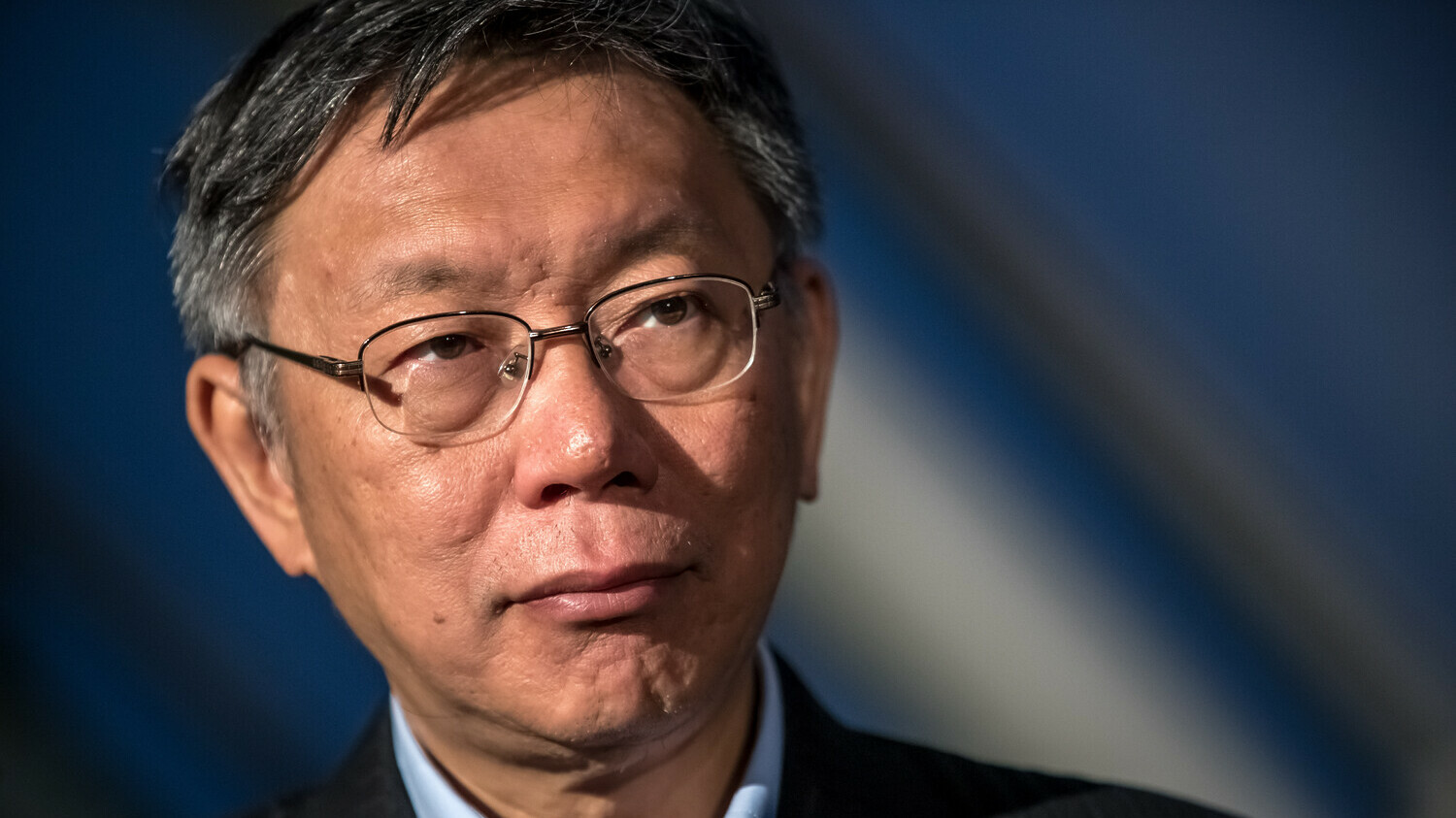
The two major opposition parties in Taiwan have agreed to field a joint candidate in the upcoming presidential election in January. The Kuomintang (KMT) and the Taiwan People’s Party (TPP) are trailing behind the ruling Democratic Progressive Party (DPP) in polls. Only together do they have realistic chances of putting forward a presidential candidate.
Representatives of both parties have been in talks for weeks about a joint candidacy. However, they have not been able to agree on who should be the lead candidate: Hou Yu-ih from the KMT or Ko Wen-je from the TPP.
On Wednesday, they reached the following compromise: The opinion polls conducted between Nov. 7 and this Friday will determine who will be the joint candidate. The nomination will be announced on Saturday. “Whatever happens, whoever takes the lead and whoever the deputy is, everyone will cooperate,” said Hou on Wednesday.
This suddenly gives a politician excellent chances for the presidency, who has often been good for surprises. Ko Wen-je, an independent candidate with no prior political experience, became the mayor of Taiwan’s capital, Taipei, in 2014. The tendentially China-critical DPP withdrew its candidate at that time, supporting Ko in the race against the more China-friendly KMT, which had dominated local politics in Taipei for decades. Four years later, Ko won again, this time against candidates from both major parties, and shortly thereafter founded the Taiwan People’s Party, TPP. Now, he wants to become the president of the country.
Ko originally gained prominence not as a politician but as a surgeon at the National Taiwan University Hospital, where he played a leading role in developing organ transplantation procedures. This earned him the nickname “Ko-P” (Professor Ko) among his supporters.
Ko presents himself as both a pragmatic doer and a force of renewal against the two established parties. With bold statements and a sophisticated social media strategy, he resonates particularly well with younger people, with around half of first-time voters supporting him.
In a recent meeting with the Taiwan Foreign Correspondents Club (TFCC), Ko spoke to international media for the first time about his presidential ambitions. He criticized both the KMT and DPP for their ideological battles on the crucial issue of Taiwan’s relationship with China. “Everyone talks about unification or independence, but in the end, neither happens,” he lamented.
Indeed, the overwhelming consensus in Taiwan’s society and major parties is to defend Taiwan as a de facto sovereign democratic state against the People’s Republic of China. However, none of Taiwan’s presidential candidates has formally declared independence as a goal, a step that many in the DPP would like to take but the party leadership refrains from due to fear of China’s reaction.
Ko sees the political debate mainly as a charade: the KMT claims in the election that the DPP unnecessarily provokes China, while the DPP accuses the KMT of being too close to the regime in Beijing. According to Ko, the positions of the major parties on China are closer than they admit.
When presenting his own China policy at the TFCC meeting, Ko adopted the de-risking approach from Western discussions. He considers a comprehensive economic decoupling of Taiwan from China unrealistic. However, he advocates for setting red lines in sensitive areas. Ko ruled out a free trade agreement with China, a proposal the KMT had pushed in the past. Similar to the KMT, Ko expresses a willingness to maintain dialogue with the Chinese leadership, hoping that the situation in the People’s Republic will change: “The China of Xi Jinping is not the China for eternity.”
Domestically, Ko recently proposed giving more powers to the parliament and limiting presidential executive powers. This also alludes to a possible scenario after the January elections. In Taiwan’s presidential elections, the principle of relative majority applies.
William Lai (Lai Ching-te) from the ruling DPP is currently polling just over 30 percent. While this would be enough to prevail against the fragmented opposition, it is not a majority, and he would have to be elected with the votes of a minority. Additionally, the DPP could lose its majority in the legislature in the simultaneous parliamentary elections. A political stalemate looms. However, for Ko’s proposed reforms, the constitution would need to be changed. This poses significant challenges, and both the DPP and KMT have tangible power interests at stake.
However, Ko’s loose tongue could pose a challenge to his ambitions. Through at times questionable statements, he has drawn criticism, especially from women and socially liberal-minded Taiwanese. During his time as mayor of Taipei, he remarked that it was alarming how many women in Taiwan went out without makeup.
While he often describes such comments as verbal slips, he flirts with the image of a man of clear words who shakes up the existing order. “The election campaign seems to be much more about the persons standing for election and their integrity than about substantive issues,” said Josie-Marie Perkuhn, Taiwan expert at the University of Trier, to Table.Media.
However, the revolutionary image has somewhat worn off after years in top-level politics. Ko aims to permanently establish the TPP in the party landscape. If he succeeds in the presidential elections, his party could even surpass the KMT as the main opponent of the DPP. Then, Ko would finally be part of the establishment he once rebelled against. Leonardo Pape/rad
Stephan Ruppert has been a lecturer in Intercultural Business Communication and International & Intercultural Management at Hamburg University of Applied Sciences since September.
Weidong Ye is now CEO of Airwende Umwelttechnik GmbH in Berlin. At the same time, he remains Managing Director of Emco Precision Hardware China. Emco is a holding company for companies in the technology and design sector.
Is something changing in your organization? Let us know at heads@table.media!
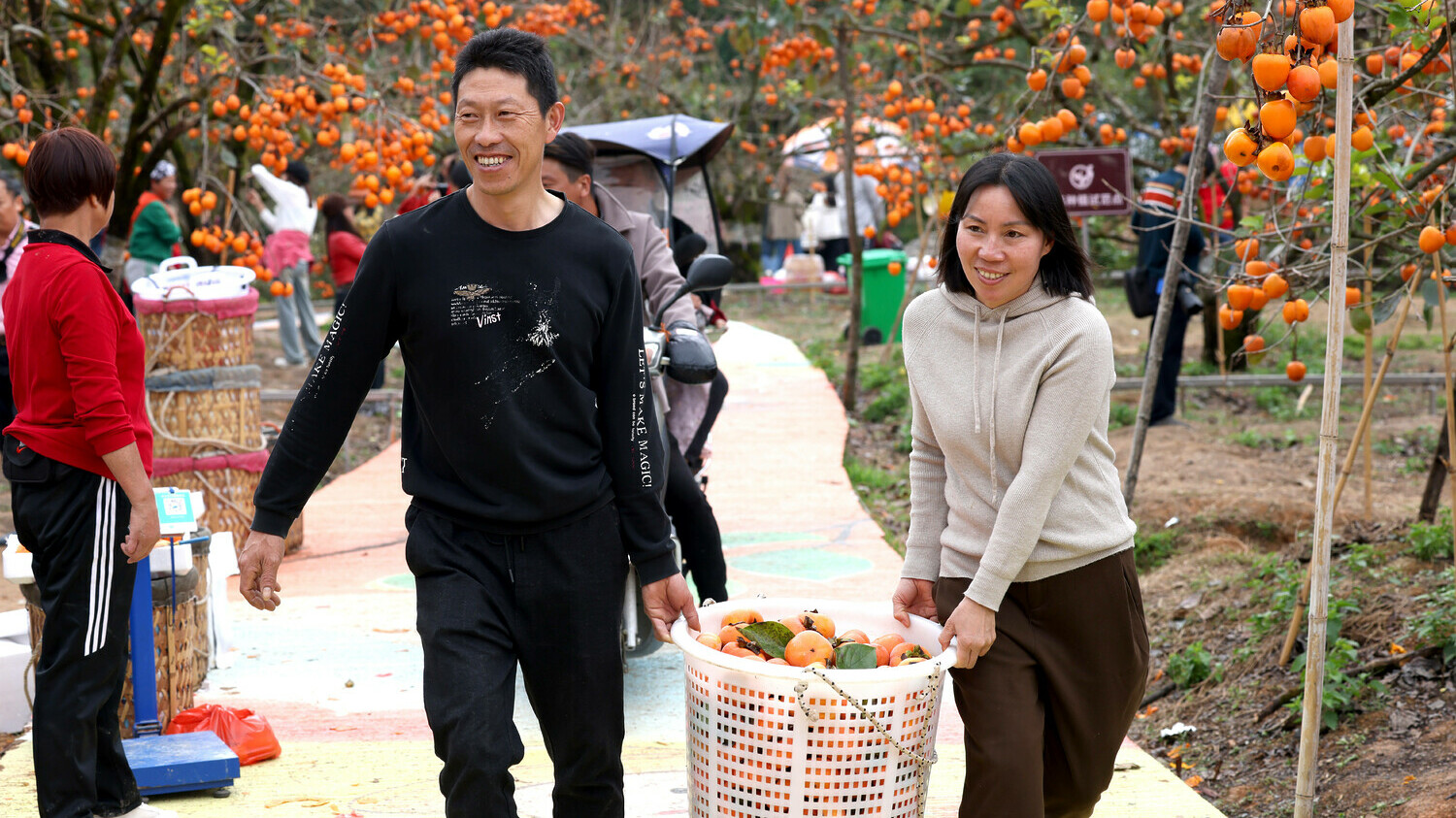
In Ningde, China, the persimmon harvest is in full swing. Historically, China predominantly cultivated the original Asian variety of this fruit, which is generally known as persimmon. However, a specific type of persimmon from Spain is rapidly gaining popularity in China. Unlike the original persimmon, which has a tough skin and is not as enjoyable to eat, this Spanish breed of persimmon allows you to simply bite into it, much like an apple.
While an unripe traditional persimmon can leave a fuzzy feeling in the mouth, this Spanish persimmon is enjoyable at various ripening stages. Given the advantages of this particular variety, it’s no wonder that some people are now returning home with buckets full of these sweet fruits.
The fascination surrounding a summit between the presidents of China and the USA remains unbroken. The phrase “the two most powerful men in the world meet” focuses the interests of eight billion people on just two individuals.
In fact, the world became a little safer on Wednesday night. China and the USA agreed to restore direct communication between their militaries. This can help quickly resolve misunderstandings that could otherwise lead to escalation and war. Given the many near-collisions of ships and aircraft, this was urgently needed. However, only Xi Jinping and Joe Biden could make this decision.
Even more important was the fact that the two heads of state are back in closer contact. In reality, the presidents of China and the USA have an astonishing degree of personal power. While US democracy may surround the head of state and government with limitations through the separation of powers, the years under Donald Trump, in particular, showed what the president can do.
Xi Jinping’s power is undisputed; after all, he has brought the Communist Party under his personal control, eliminating any resistance in the world’s most populous country. A certain degree of personal rapport may prevent something worse, as analyzed by Michael Radunski.
The data and cybersecurity laws are increasingly affecting local business for German and European companies, as shown by a recent survey by the EU Chamber. In their current interpretation, these rules prohibit the transfer of “important” data from China.
This complicates the operation of modern IT systems where data is tossed back and forth between headquarters and branches in the cloud. Christiane Kuehl reports on how local businesses are reacting and where Beijing might reconsider.


Xi Jinping and Joe Biden spoke for four hours on Wednesday. It is the first time in almost exactly a year that the leaders of the two world powers have engaged in direct dialogue. This alone speaks volumes about the state of relations between China and the United States. Today’s meeting on an estate about 40 kilometers south of San Francisco is, in itself, a positive sign.
Biden seemed to feel the need not to risk additional conflicts with China amid the crises in Ukraine and Gaza. “We must ensure that our rivalry does not end in conflict,” Biden said at the beginning. Despite the current tensions, there were some concrete results:
These decisions mark tangible progress between the USA and China. They signal that both sides are serious about stabilizing relations.
Several other issues were addressed without reaching an agreement:

For other issues, it was already foreseeable that there would be no decision, let alone a solution:
These are issues based on the fundamental conflict between the US hegemon and the challenger China. An agreement is currently not possible. Both Biden and Xi are under too much pressure to allow even the impression of leniency toward their respective rivals in these matters. Biden is facing a tough election campaign and Xi urgently needs to revive China’s economy. However, with the meeting and the agreements reached, at least the downward spiral of recent months has been broken.
However, the US and China intend to revive their bilateral climate cooperation and jointly engage in reducing methane emissions and tripling renewable energies. This is stated in a joint statement released on Wednesday after a meeting between climate envoys John Kerry and Xie Zhenhua.
Li Shuo, who will soon become the director of the China Climate Hub at the Asia Society, described the relations between the world’s two largest greenhouse gas emitters as “a prerequisite for meaningful global progress”. Both countries had already agreed to triple renewable capacities at the G20 meeting in India.
However, both sides did not reach a common position on phasing out fossil fuels – an issue that will be a central point of contention at the upcoming climate conference. The joint statement only mentions a commitment to expand renewables “to accelerate the substitution of coal, oil, and gas generation”. China considers the complete abandonment of fossil fuels “unrealistic”. Ying Yuan of Greenpeace East Asia said, “At the moment, these are still words and not actions. There is still a big gap between these words and actions for both sides.” Collaboration: Finn Mayer-Kuckuk/Nico Beckert

The European Union Chamber of Commerce in China (EUCCC) is hopeful for prompt clarity on rules for cross-border data transfer (CBDT) for its member companies. The recently presented draft for easing the strict laws gives cause for optimism, the chamber stated in a flash survey released on Wednesday. However, much is still unclear – especially whether the proposed simplifications will indeed materialize.
According to the survey, 55 percent of companies transfer data abroad, 31 percent do not, while 14 percent -interestingly – do not know precisely. Of those sending data abroad, 96 percent send them internally – to their headquarters or other regional offices. According to EUCCC, these transfers pose a low data security risk. Each 24 percent of respondents transfer data to suppliers or other business partners abroad.
The effects of laws enacted over the past years are already noticeable, according to the survey. 59 percent of respondents complain about increased compliance costs, 41 percent about pressure to localize IT systems or the entire operation of the China branch, thereby separating it from the rest of the world. However, 31 percent also state that the rules have improved the company’s data security management.
The laws in question are three, some of whose contents are still vaguely formulated:
At the end of September, the Cybersecurity Administration of China (CAC) raised hopes with a draft for easing and a lenient interpretation of general provisions for CBDT for foreign companies. Among other things, a list of exceptions from relevant obligations was discussed.
Moreover, the changes should bring more clarity about how data processors can check which data the authorities classify as “important”. However, only six percent of companies send what they themselves consider “important data” abroad, 81 percent would like to understand the term better.
According to consultants from Dezan Shira, the PIPL currently refers to “data that can endanger national security, economic operations, social stability or public health and safety once manipulated, destroyed, leaked or illegally obtained or used”. This can be almost anything with a strict interpretation. 59 percent of surveyed companies also want to know more precisely what the PIPL means by “personal information”.
Among the surveyed companies, 78 percent send employee data abroad, as well as 67 percent personal data of suppliers and customers. The EU Chamber concludes that these transfers are necessary for personnel purposes or to fulfill contracts, thus requiring an exemption for such transfers. The hope now is that the planned easing will bring precisely these exemptions.
The EU Chamber of Commerce aims to ensure that the relaxations are implemented as announced. “It is positive that China’s relevant authorities signal the intention to optimize the country’s data regulations,” said Chamber Vice President Stefan Bernhart. “European companies hope for more clarity on the associated terms and that their legitimate business needs will be considered both in sectoral regulations and compliance deadlines.”
According to the paper, security checks for data exports could now be relaxed
This applies, at least, when these do not include personal or “important” data. Additionally, the CAC may also consider completely abolishing security checks for personal data in certain situations, such as cross-border purchases, hotel reservations, hiring employees, or processing visa applications.
All of this would represent a significant improvement over the current legal situation. The EU Chamber is calling for the prompt adoption of the draft.

According to a report from Manager Magazin, the Chinese online retailer JD.com has expressed interest in acquiring the German electronics chains MediaMarkt and Saturn. One of the current owners, the investment company Haniel, has long been expecting a higher return on capital from Ceconomy, the operator of both retail chains. Negotiations between JD and Ceconomy are currently underway, as reported. The companies have not made any official statements, and the outcome of the negotiations is still uncertain.
JD is currently expanding into Europe and has already launched the trading platform Ochama there. Due to the low stock price of Ceconomy, it would be relatively inexpensive for a Chinese buyer at the moment. At the same time, growth in China’s home market has somewhat slowed down. fin

Robin Li, CEO of Baidu, cautioned on Wednesday at an industry forum in Shenzhen about the squandering of resources in the development of large AI language models. Li observed a phenomenon in China where many industries, companies, and even cities are acquiring hardware, stockpiling chips and building data centers to independently train proprietary large models from scratch. While these entities aim to develop significant language models, a considerable number lack a sustainable business model.
The release of OpenAI’s ChatGPT last year sparked immense interest in such applications in China, prompting both established companies like Baidu and numerous small startups to enter the competition for the best model.
Li likened a chatbot to an operating system, serving as the foundation for many other applications. However, he cautioned that the continuous development of fundamental large models represents a significant waste of social resources. Li recommended that companies, instead of exclusively focusing on large language models, should concentrate on the development of practical applications.
Baidu’s own chatbot, Ernie, was made publicly available in August but has thus far proven to be a disappointment for the tech industry. rad
It’s not just policymakers expressing concerns about Germany’s strong economic ties with China; investors are also raising red flags. Union Investment, the second-largest fund manager in the country with assets under management of around 432 billion euros, is cautioning against excessive dependence on the People’s Republic. According to a study covering nearly 2,000 publicly traded companies worldwide, Union Investment notes that “no other country, not even direct neighbors of China like Japan and South Korea, has so many large companies with high China exposure“. This applies to almost a quarter of all examined German companies.
China has been Germany’s largest trading partner since 2016, with bilateral trade totaling nearly 300 billion euros last year. In response to these ties, the German government released its China strategy in the summer, urging German companies to reduce their risks in China-related business and to internally account for so-called cluster risks when focusing on a large market. Investment and export credit guarantees are set to face stricter scrutiny.
The study by Union Investment highlights a noteworthy trend: German companies are increasingly shifting research and development activities to China, especially in the automotive sector. The study underscores, “This is remarkable because other companies are, for security reasons, bringing these functional areas back home.” This strategy, according to analysts, is risky on multiple levels. “As areas with higher value-added are withdrawn from the home country and, at the same time, the supplier industry loses orders, the economic location of Germany suffers,” warn the analysts.
Union Investment holds shares in nearly all major publicly traded companies, including automakers like Volkswagen, BMW and Mercedes-Benz, as well as the chemical giant BASF, all of which have strong ties to China. German automakers should expect retaliatory measures if Berlin attempts to shield them from Asian competitors in their domestic market. The study notes, “Unlike ten years ago, the technologies offered by German automakers can now be replaced. Retaliation will be less painful for China – a well-known critical factor for Beijing.” rtr
In the first three quarters, 5.69 million marriages were registered in China. This is 245,000 more than at the same time last year, according to data from the Ministry of Civil Affairs. This could halt a nine-year downward trend, as fewer and fewer people have been getting married in China since 2013. At that time, nearly 13.5 million couples said “I do.”
The upswing in marriages is seen as a glimmer of hope amid a declining birth rate and a rapidly aging population, as reported by the “South China Morning Post“. These long-term demographic challenges have long been casting shadows on the economic prospects of the People’s Republic. Therefore, pilot projects have been launched in over 20 cities to create a “new era of marriage and childbirth culture“. rad

Bishop Joseph Li Shan, appointed by China bypassing the Vatican, traveled to Hong Kong for a several-day visit on Tuesday. It marks a rare contact between the state-controlled Catholic Church in China and the actual Catholic Church with the Vatican at its helm.
China retains control over religion in its own country. However, there is an agreement on the mutually agreed-upon filling of bishop positions. The Pope does not want Catholic Christians in China to be without organization. Nevertheless, Beijing consistently irks the Vatican by autonomously appointing bishops.
Conversely, the Pope appointed the Bishop of Hong Kong without consultation with Beijing. Bishop Li’s visit to the southern Chinese metropolis can now be interpreted as a sign of relaxation. fin

The two major opposition parties in Taiwan have agreed to field a joint candidate in the upcoming presidential election in January. The Kuomintang (KMT) and the Taiwan People’s Party (TPP) are trailing behind the ruling Democratic Progressive Party (DPP) in polls. Only together do they have realistic chances of putting forward a presidential candidate.
Representatives of both parties have been in talks for weeks about a joint candidacy. However, they have not been able to agree on who should be the lead candidate: Hou Yu-ih from the KMT or Ko Wen-je from the TPP.
On Wednesday, they reached the following compromise: The opinion polls conducted between Nov. 7 and this Friday will determine who will be the joint candidate. The nomination will be announced on Saturday. “Whatever happens, whoever takes the lead and whoever the deputy is, everyone will cooperate,” said Hou on Wednesday.
This suddenly gives a politician excellent chances for the presidency, who has often been good for surprises. Ko Wen-je, an independent candidate with no prior political experience, became the mayor of Taiwan’s capital, Taipei, in 2014. The tendentially China-critical DPP withdrew its candidate at that time, supporting Ko in the race against the more China-friendly KMT, which had dominated local politics in Taipei for decades. Four years later, Ko won again, this time against candidates from both major parties, and shortly thereafter founded the Taiwan People’s Party, TPP. Now, he wants to become the president of the country.
Ko originally gained prominence not as a politician but as a surgeon at the National Taiwan University Hospital, where he played a leading role in developing organ transplantation procedures. This earned him the nickname “Ko-P” (Professor Ko) among his supporters.
Ko presents himself as both a pragmatic doer and a force of renewal against the two established parties. With bold statements and a sophisticated social media strategy, he resonates particularly well with younger people, with around half of first-time voters supporting him.
In a recent meeting with the Taiwan Foreign Correspondents Club (TFCC), Ko spoke to international media for the first time about his presidential ambitions. He criticized both the KMT and DPP for their ideological battles on the crucial issue of Taiwan’s relationship with China. “Everyone talks about unification or independence, but in the end, neither happens,” he lamented.
Indeed, the overwhelming consensus in Taiwan’s society and major parties is to defend Taiwan as a de facto sovereign democratic state against the People’s Republic of China. However, none of Taiwan’s presidential candidates has formally declared independence as a goal, a step that many in the DPP would like to take but the party leadership refrains from due to fear of China’s reaction.
Ko sees the political debate mainly as a charade: the KMT claims in the election that the DPP unnecessarily provokes China, while the DPP accuses the KMT of being too close to the regime in Beijing. According to Ko, the positions of the major parties on China are closer than they admit.
When presenting his own China policy at the TFCC meeting, Ko adopted the de-risking approach from Western discussions. He considers a comprehensive economic decoupling of Taiwan from China unrealistic. However, he advocates for setting red lines in sensitive areas. Ko ruled out a free trade agreement with China, a proposal the KMT had pushed in the past. Similar to the KMT, Ko expresses a willingness to maintain dialogue with the Chinese leadership, hoping that the situation in the People’s Republic will change: “The China of Xi Jinping is not the China for eternity.”
Domestically, Ko recently proposed giving more powers to the parliament and limiting presidential executive powers. This also alludes to a possible scenario after the January elections. In Taiwan’s presidential elections, the principle of relative majority applies.
William Lai (Lai Ching-te) from the ruling DPP is currently polling just over 30 percent. While this would be enough to prevail against the fragmented opposition, it is not a majority, and he would have to be elected with the votes of a minority. Additionally, the DPP could lose its majority in the legislature in the simultaneous parliamentary elections. A political stalemate looms. However, for Ko’s proposed reforms, the constitution would need to be changed. This poses significant challenges, and both the DPP and KMT have tangible power interests at stake.
However, Ko’s loose tongue could pose a challenge to his ambitions. Through at times questionable statements, he has drawn criticism, especially from women and socially liberal-minded Taiwanese. During his time as mayor of Taipei, he remarked that it was alarming how many women in Taiwan went out without makeup.
While he often describes such comments as verbal slips, he flirts with the image of a man of clear words who shakes up the existing order. “The election campaign seems to be much more about the persons standing for election and their integrity than about substantive issues,” said Josie-Marie Perkuhn, Taiwan expert at the University of Trier, to Table.Media.
However, the revolutionary image has somewhat worn off after years in top-level politics. Ko aims to permanently establish the TPP in the party landscape. If he succeeds in the presidential elections, his party could even surpass the KMT as the main opponent of the DPP. Then, Ko would finally be part of the establishment he once rebelled against. Leonardo Pape/rad
Stephan Ruppert has been a lecturer in Intercultural Business Communication and International & Intercultural Management at Hamburg University of Applied Sciences since September.
Weidong Ye is now CEO of Airwende Umwelttechnik GmbH in Berlin. At the same time, he remains Managing Director of Emco Precision Hardware China. Emco is a holding company for companies in the technology and design sector.
Is something changing in your organization? Let us know at heads@table.media!

In Ningde, China, the persimmon harvest is in full swing. Historically, China predominantly cultivated the original Asian variety of this fruit, which is generally known as persimmon. However, a specific type of persimmon from Spain is rapidly gaining popularity in China. Unlike the original persimmon, which has a tough skin and is not as enjoyable to eat, this Spanish breed of persimmon allows you to simply bite into it, much like an apple.
While an unripe traditional persimmon can leave a fuzzy feeling in the mouth, this Spanish persimmon is enjoyable at various ripening stages. Given the advantages of this particular variety, it’s no wonder that some people are now returning home with buckets full of these sweet fruits.
